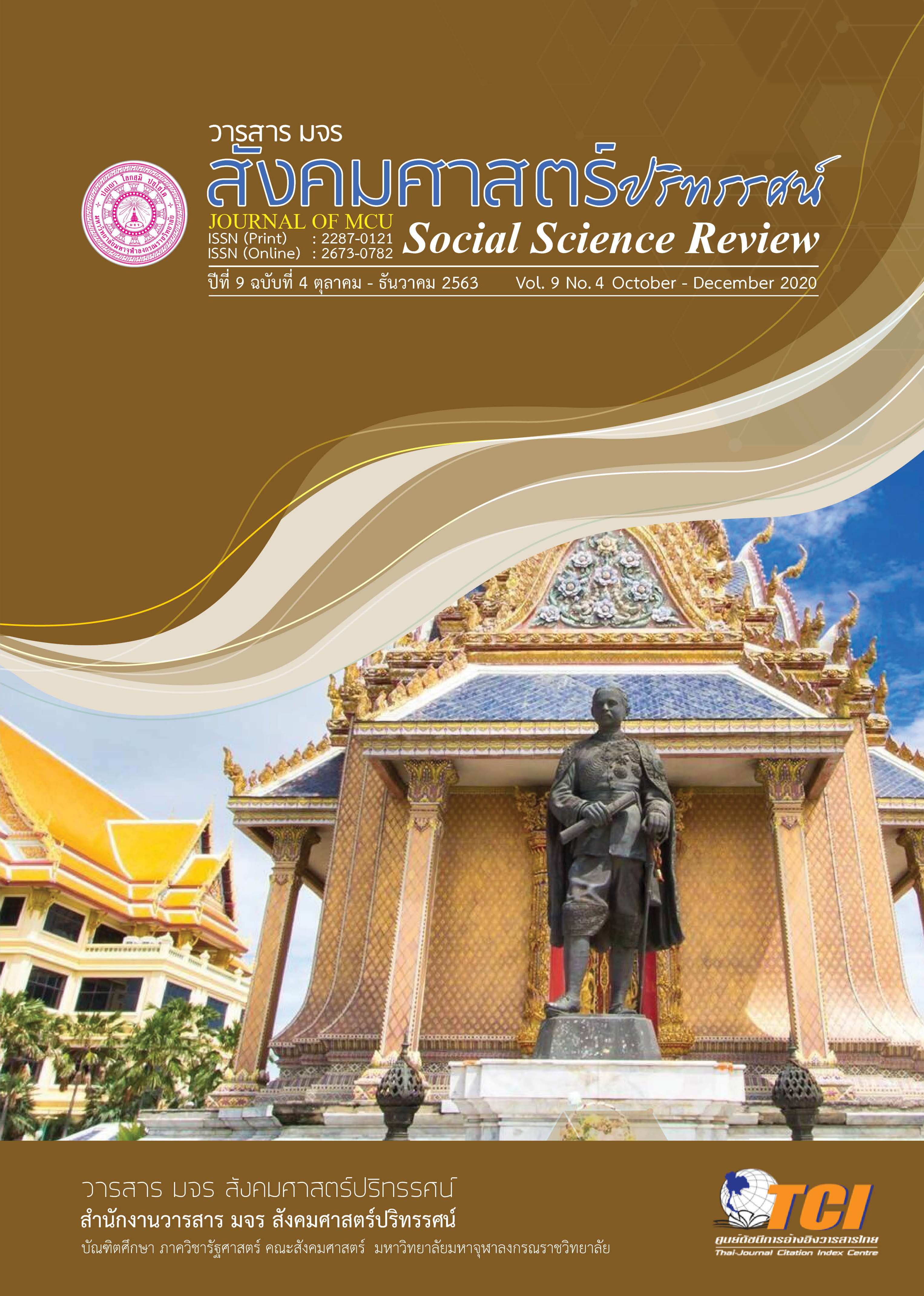ผู้นำเชิงพุทธกับการพัฒนาประชาธิปไตย
คำสำคัญ:
ภาวะผู้นำ, ผู้นำเชิงพุทธ, การพัฒนาประชาธิปไตยบทคัดย่อ
การพัฒนาประชาธิปไตยที่ผ่านมาส่งผลต่อชีวิตและความเป็นอยู่ของประชาชนในสังคมนั้น ประเทศไทยก็ได้ตระหนักมาตลอดถึงความสำคัญของการพัฒนาประชาธิปไตย ว่าจะทำอย่างไรให้มีเสถียรภาพ มีความสงบเรียบร้อย ไม่มีความขัดแย้งเกิดขึ้น อย่างไรก็ตาม ตามข้อเท็จจริงของการปกครองระบอบประชาธิปไตย จะให้ความสำคัญกับคำว่า เสรีภาพ ความเสมอภาค และความเท่าเทียม คือ ไม่มีการแบ่งชนชั้น ซึ่งทุกสังคมให้การยอมรับและให้ความสำคัญ ทั้งนี้การพัฒนาประชาธิปไตยจะเห็นว่าจุดมุ่งเน้นจริง ๆ ของการพัฒนาก็คือการเริ่มต้นจากการพัฒนาระดับปัจเจกบุคคลไปก่อนจากนั้นจึงเริ่มไปสู่การพัฒนาในระดับชุมชน สังคมและประเทศชาติ ดังนั้น การนำหลักทางพระพุทธศาสนามาพัฒนาประชาธิปไตยผู้เขียนเห็นว่าควรเริ่มต้นจากการพัฒนาที่ตัวบุคคลผู้นำก่อน โดยการนำหลักพุทธธรรมมาประยุกต์ใช้ ได้แก่ หลักสัปปุริสธรรม 7 มีการกล่าวถึงคุณสมบัติสำหรับสัปปุริสชนหรือคนดีหรือธรรมของผู้ดี ซึ่งเป็นแนวทางที่ดีที่ควรนำมาปฏิบัติ เป็นธรรมที่ทำให้ผู้นำเป็นผู้นำสมบูรณ์แบบ ให้สอดคล้องกับความเป็นระบอบประชาธิปไตย สามารถนำมาสังเคราะห์สู่กระบวนการบูรณาการให้สอดคล้องกับผู้นำในระบอบประชาธิปไตย
เอกสารอ้างอิง
เกียรติศักดิ์ สุขเหลือง. (2561). กลยุทธ์การบริหารองค์กรสงฆ์ที่เข้มแข็งในยุคโลกาภิวัตน์. วารสาร มจร สังคมศาสตร์ปริทรรศน์, 7(1), 99-115.
ชัยอนันท์ สมุทรวานิช. (2538). พุทธศาสนากับการพัฒนาประชาธิปไตยในประเทศไทย. (วิทยานิพนธ์ศิลปศาสตรมหาบัณฑิต สาขาวิชารัฐศาสตร์). กรุงเทพฯ: มหาวิทยาลัยรามคำแหง.
เนตรพัณณา ยาวิราช. (2556). การจัดการสมัยใหม่. กรุงเทพฯ: บริษัททริปเพิ้ล กรุ๊ป จำกัด.
พงศธร ไชยเสน. (2563). การพัฒนาระบอบประชาธิปไตยให้มั่นคงและยั่งยืน สำนักงานศาลรัฐธรรมนูญ. สืบค้น 20 พฤษภาคม 2563, จาก http://www.constitutionalcourt.or.th/occ_web/ewt_dl_link.php?nid=1457
พระครูสิริจันทนิวิฐ (บุญจันทร์ เขมกาโม). (2549). ภาวะผู้นำเชิงพุทธ. กรุงเทพฯ: นิติธรรมการพิมพ์.
พระธรรมโกศาจารย์ (ประยูร ธมฺมจิตฺโต). (2549). พุทธวิธีบริหาร (พิมพ์พิเศษ 5 ธันวาคม 2549). กรุงเทพฯ: โรงพิมพ์มหาจุฬาลงกรณราชวิทยาลัย.
พระธรรมปิฎก (ป.อ.ปยุตฺโต). (2546). สลายความขัดแย้ง: นิติศาสตร์-รัฐศาสตร์-เศรษฐศาสตร์แนวพุทธ. กรุงเทพฯ: โรงพิมพ์ บริษัทสหธรรมิก จำกัด.
________. (2543). กระบวนการเรียนรู้เพื่อพัฒนาคนไปสู่ประชาธิปไตย. กรุงเทพฯ: โรงพิมพ์มหาจุฬาลงกรณราชวิทยาลัย.
พระพรหมคุณาภรณ์ (ป.อ.ปยุตฺโต). (2546). ภาวะผู้นำ: ความสำคัญต่อการพัฒนาคน พัฒนาประเทศ. กรุงเทพฯ: ธรรมสภา.
พูนลาภ แก้วแจ่มศรี. (2546). การจัดการเชิงพุทธ : การสำรวจปรัชญาและแนวคิดสำหรับการจัดการสมัยใหม่ (วิทยานิพนธ์รัฐประศาสนศาสตรมหาบัณฑิต). กรุงเทพฯ: สถาบันบัณฑิตพัฒนบริหารศาสตร์.
มหาจุฬาลงกรณราชวิทยาลัย. (2539). พระไตรปิฎกภาษาไทย ฉบับมหาจุฬาลงกรณราชวิทยาลัย. กรุงเทพฯ: โรงพิมพ์มหาจุฬาลงกรณราชวิทยาลัย.
ยงยุทธ เกษสาคร. (2554). ภาวะผู้นำและการทำงานเป็นทีม. กรุงเทพฯ: เอสแอนด์ เจ กราฟฟิค.
สัญญา เคณาภูมิ. (2558). วิถีประชาธิปไตยของพลเมืองในระบอบประชาธิปไตย. วารสารวไลยอลงกรณ์ปริทัศน์, 5(2), 195-196.
สาโรจน์ โอพิทักษ์ชีวิน. (2554). การจัดการและพฤติกรรมองค์กร: เพื่อสร้างและรักษาความได้เปรียบเชิงแข่งขันไว้ให้ยั่งยืนในโกลบอลไลเซชั่น. กรุงเทพฯ: ซีวีแอลการพิมพ์จำกัด.
สุเทพ พงศ์ศรีวัฒน์. (2550). ภาวะความเป็นผู้นำ. กรุงเทพฯ: ส. เอเชียเพรส 1989 จำกัด.
สุริยา รักษาเมือง. (2561). ธรรมาธิปไตย : อุดมคติเพื่อการสร้างความสมดุลแห่งอำนาจในการปกครองรัฐ. วารสาร มจร สังคมศาสตร์ปริทรรศน์, 7(4), 150-157.
Burdy, R. J. (1967). Fundermental of Leadership Reading. Masschusetts Addison: Wesley Publishing Co.
Cohen. W. C. (1971). Democracy. New York: The Free Press.
Jones, G., & George, G. M. (2009). Contemporary Management (5th ed.). New York: McGraw-Hill.
Normond, L.F., & Harry K. J. (1996). The Leader : Developing the Skill & Personal Quantities You Need to Lead Effectively. New York: American Management Association.
ดาวน์โหลด
เผยแพร่แล้ว
รูปแบบการอ้างอิง
ฉบับ
ประเภทบทความ
สัญญาอนุญาต
ลิขสิทธิ์ (c) 2020 วารสาร มจร สังคมศาสตร์ปริทรรศน์

อนุญาตภายใต้เงื่อนไข Creative Commons Attribution-NonCommercial-NoDerivatives 4.0 International License.
เพื่อให้เป็นไปตามกฎหมายลิขสิทธิ์ ผู้นิพนธ์ทุกท่านต้องลงลายมือชื่อในแบบฟอร์มใบมอบลิขสิทธิ์บทความให้แก่วารสารฯ พร้อมกับบทความต้นฉบับที่ได้แก้ไขครั้งสุดท้าย นอกจากนี้ ผู้นิพนธ์ทุกท่านต้องยืนยันว่าบทความต้นฉบับที่ส่งมาตีพิมพ์นั้น ได้ส่งมาตีพิมพ์เฉพาะในวารสาร มจร สังคมศาสตร์ปริทรรศน์ เพียงแห่งเดียวเท่านั้น หากมีการใช้ภาพหรือตารางหรือเนื้อหาอื่นๆ ของผู้นิพนธ์อื่นที่ปรากฏในสิ่งตีพิมพ์อื่นมาแล้ว ผู้นิพนธ์ต้องขออนุญาตเจ้าของลิขสิทธิ์ก่อน พร้อมทั้งแสดงหนังสือที่ได้รับการยินยอมต่อบรรณาธิการ ก่อนที่บทความจะได้รับการตีพิมพ์ หากไม่เป็นไปตามข้อกำหนดเบื้องต้น ทางวารสารจะถอดบทความของท่านออกโดยไม่มีข้อยกเว้นใดๆ ทั้งสิ้น





